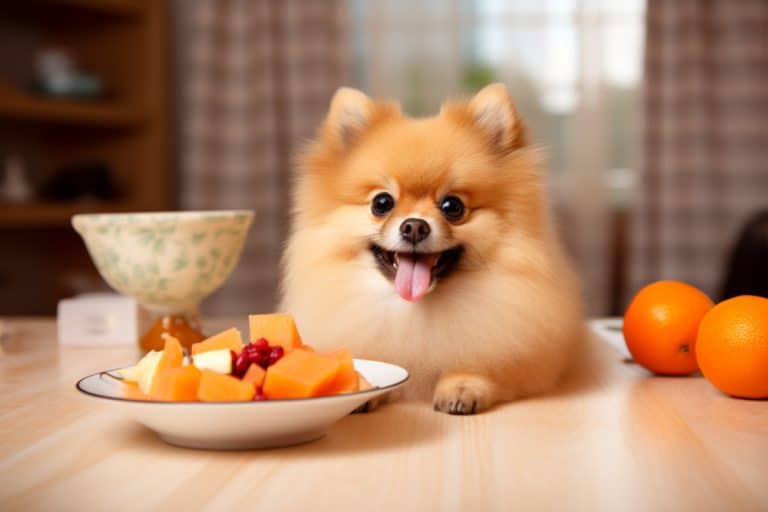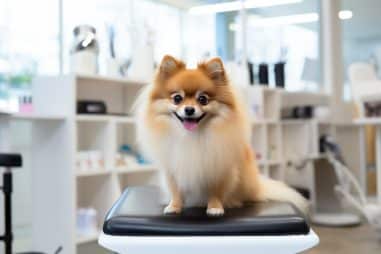Choosing the right diet for your Pomeranian isn’t just about keeping them full. It’s a multifaceted decision involving proper nutrition, seasonal changes, and the dog’s individual needs. A well-balanced diet is essential for a happy, healthy Pomeranian life. In this guide, we’ll deep dive into what your furry friend should eat, what should be avoided, and how to make sure they’re getting everything they need. You’ll gain expert-backed advice on making wise food choices, covering every stage from puppyhood to old age.
The Nutritional Needs of a Pomeranian
Proteins
Muscle development is crucial for your Pomeranian, and protein plays a significant role in this. High-quality protein sources like chicken, turkey, and fish are ideal. A general rule of thumb is one gram of protein per pound (0.45 kg) of body weight. This means if your Pomeranian weighs around 10 pounds (about 4.5 kg), you’ll want to aim for 10 grams of protein each day. Don’t forget, not all proteins are created equal. Look for those that are easy to digest and are high in essential amino acids.
Fats
Fats are another essential macronutrient. Healthy fats like omega-3 and omega-6 fatty acids contribute to a luscious, glossy coat. Around 8-10% of your Pomeranian’s diet should be healthy fats. These fats also support brain development and function, so don’t shy away from them.
Carbohydrates
Carbs aren’t just filler; they offer an extra source of energy and help with digestion. Brown rice and sweet potatoes are easily digestible carbs that can be a part of your Pomeranian’s diet. While carbs should make up a smaller portion of the diet (around 10-15%), the amount can be adjusted based on your Pomeranian’s activity level.
Micronutrients
Vitamins and minerals may seem less significant but they’re essential for functions like bone health, blood clotting, and immune system strength. Ensure your dog’s diet has a balanced mix of vitamins like A, D, and E, along with minerals like calcium and phosphorus.
Can Pomeranians Eat Human Food?
Human food can be tempting for both you and your Pomeranian. Before you share that scrap from your plate, it’s important to know what’s safe.
Safe Foods
Lean meats like cooked chicken, turkey, and some types of fish can be excellent additional protein sources. Fruits and veggies like carrots, cucumbers, and blueberries are also safe in moderation.
Unsafe Foods
Steer clear from foods like chocolate, grapes, onions, and anything containing caffeine. These foods can be toxic and lead to severe health issues like poisoning, or in worst-case scenarios, death.
Portion Control
Even safe human food should be given with care. It’s easy to tip the scales into overfeeding, which can lead to obesity. Make sure human food doesn’t comprise more than 10% of their daily calorie intake.
What Fruits Can a Pomeranian Eat?
Fruits can be an excellent treat for your Pomeranian, offering both flavor and vital nutrients.
Safe Fruits
Apples, pears, and bananas can be wonderful treats. They offer vitamins and are generally safe for dogs when given in small amounts. It is important to remove any seeds or pits, as they can be dangerous if swallowed or may contain harmful chemicals.
Fruits to Avoid
Grapes and raisins are a complete no-no. These can lead to kidney failure, which could be fatal. Citrus fruits like oranges and lemons are also best avoided as they can upset your dog’s stomach.
What Is the Best Dog Food for Pomeranians?
When it comes to commercial dog food, quality really counts.
Recommended Brands
Brands like Hill’s Science Diet, Royal Canin, and Blue Buffalo come highly recommended. Always look for dog food that lists a high-quality protein source as the first ingredient and doesn’t contain any fillers like corn or soy. A high-quality 30-pound bag could cost around $60 to $70.
What to Feed a Pomeranian Puppy
Feeding a Pomeranian puppy requires specialized attention, as their diet must be rich in nutrients that will aid in their rapid development. The puppy stage is crucial for establishing strong bones, a healthy coat, and a robust immune system. Let’s delve into some food options that are best suited for a Pomeranian puppy.
Kibble for Puppies
Opt for high-quality puppy kibble that lists a quality source of animal protein as its first ingredient. Highly recommended brands formulate their food with the right balance of protein, fats, and essential minerals.
Wet Food
Some puppies prefer the texture and taste of wet food. It’s also easier to digest. Look for grain-free options that have quality protein listed as the first ingredient. However, if you choose to feed wet food, make sure to monitor your puppy’s dental health, as it tends to stick to teeth more than dry food.
Raw Food Diet
A raw food diet for a Pomeranian puppy could include raw chicken, beef, and occasionally fish. This kind of diet must be well-balanced and carefully measured to include the essential vitamins and minerals. Consult your vet before putting your Pomeranian puppy on a raw food diet, especially to ensure it’s balanced and free of parasites.
Homemade Meals
If you prefer cooking for your puppy, that’s a viable option as well. Meals can include cooked chicken or turkey, rice, and boiled vegetables like carrots and peas. Make sure to consult your vet for a balanced recipe. Homemade food should be carefully portioned to avoid overfeeding.
Nutrient Supplements
Puppies need calcium and phosphorus for bone development, DHA for brain development, and plenty of vitamins for a robust immune system. If you’re preparing homemade meals, consider adding a multivitamin or specific nutrient supplements recommended by your vet.
How Much Does a Pomeranian Eat?
Adult Pomeranians don’t require a lot of food. Typically, a cup of food per day, split between two meals, suffices.
Varying Portions
Keep in mind that portion sizes should be adjusted according to the dog’s age, weight, and activity level. An active Pomeranian may require more food, while older or less active ones may require less.
Measuring Food
Consistency is key to a balanced diet. Using a standard measuring cup will ensure you’re not overfeeding or underfeeding your dog. This simple tool can make a significant difference in your pet’s health.
Can Pomeranians Drink Milk?
Dairy is a controversial topic when it comes to dogs. While some Pomeranians might like the taste, many are lactose intolerant, which can lead to digestive problems.
Alternatives
Fresh water is always the best choice. However, if you’re looking for something different, dog-safe milk substitutes are available at pet stores. Chicken or beef broth can also serve as an occasional treat.
Conclusion
Your Pomeranian’s diet is a critical part of their well-being, affecting everything from their energy levels to their coat’s shine. With a balanced mix of protein, fats, and carbs, along with essential vitamins and minerals, your Pomeranian will be set for a happy, healthy life. Tailor the diet based on age, medical conditions, and lifestyle, and you’ll be well on your way to having a happy, healthy furry friend.








